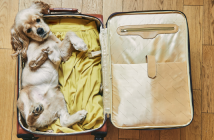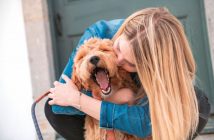Thanksgiving may be a celebratory holiday that brings your family and friends together, but it poses a serious hazard for pets. Follow these tips below to keep your pets safe and healthy during this upcoming holiday season.
Food Safety Tips
Overeating is unhealthy for both you and your pets, but fatty foods are even more dangerous for your pets since they’re harder to digest. Turkey bones can also severely damage your pet’s digestive tracts and sweets can be deadly to your dog as well.
Keep the Food on the Table
Even the smallest amount of turkey can cause a dangerous condition among pets called pancreatitis. Additionally, since fatty and other healthy foods are harder for animals to digest, it’s hazardous for animals to have access to these kinds of food, such as grapes, onions, and grapes. If you want to offer your pet a treat this Thanksgiving, make sure you feed them food that’s made specifically for them.
Don’t Offer Them Deserts
Desserts can be incredibly harmful to your pets, which is why it’s important to keep them out of reach. Artificial sweetener called xylitol, which is used in some sugar-free goods and gum, can be deadly to both dogs and cats. Not to mention, yeast dough can cause deadly bloating and gas in pets.
Keep Trash Away From Your Pets
Trash, including leftover food, that is out in the open can be deadly to your pets. It is important that you properly dispose of turkey bones and carcasses to prevent your pets getting sick. You should also be sure to place your trash in a closed trash container that’s behind a locked door.
Take Quick Action
If you think your pet has eaten anything dangerous; don’t hesitate to call your local vet. You should also call the ASPCA Poison Control Hotline in case your pet shows sign of distress, such as depression, pain, diarrhea, or vomiting.
Party Tips
If you are hosting guests or throwing a big Thanksgiving party, you should plan ahead to ensure that your pets stay safe amount the hustle and bustle.
Pets and Visitors
Sometimes, visitors can upset your pets. Pets can be excitable or shy with new people or large crowds. If your pet is nervous or excitable with new visitors, put them in a different room or in their crate with their toys. This will help them to feel more comfortable in the stressful situation.
Keep an Eye on the Door
Even if your pets are comfortable with guests, you should pay close attention to them around the door. This is especially true when your visitors are entering and leaving the home. The last thing you want is to spend your holiday looking for and worrying about a lost dog or cat. Make sure that your pet is microchipped and/or has up to date ID tags.
Watch Out for Your Decorative Plants
Decorative flowers can be incredibly dangerous for your pets if they try eating them. Festive plants such as Baby’s Breath, Sweet William, and some ferns can be just as toxic to your pets. If you have any out around your house, make sure you keep them out of reach.
Keep an Eye on Your Pets around Decorations
Leaving your pets around holiday decorations can be potentially dangerous. Don’t leave your dog or cat around lit candles because it could cause a fire in your home. Also, pine cones and other decorations can cause serious internal damage to your pets.
Tips for Travel
Regardless of whether you are taking your pets with you when traveling for the holiday or leaving them behind, there are steps you should take to ensure their safety. These tips ring true no matter what time of year you are traveling.
Health Certificates
If you are traveling across state lines or international borders, you may need to provide a health certificate from a veterinarian. This is true no matter if you are traveling by car or airplane. Before you leave on your trip, make sure you check the requirements for the states you will drive through or visit. If needed, make sure you get the correct certificate. Give yourself enough time to schedule a veterinary appointment for your pet in time for your trip.
Restrain Pets in the Car
When driving, your pet should remain securely in a carrier or harness attached to a seat belt. They should also be in a clear line of an airbag. You should never travel with your pet in the bed of a truck. Keeping your pet in a safe location will protect your pet in the event of a car accident, sudden swerve, or short stop. It can also stop them from distracting the driver and from getting stuck in small spaces.
Air Travel
Before you purchase your airline ticket, talk to your vet about bringing your pet on a plane. It can be risky to bring certain pets an airplane like an old cat or a dog with a short snout. Your vet will be able to describe the risks of air travel and help you decide what option is best for your pets.








